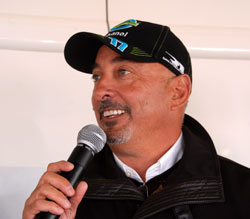 Just being able to snag a ticket to the race means a huge Indy experience for most racing fans. But, some race-goers are lucky enough to snag tickets for the Hot Lap, taking their Indy experience one step further. The Ethanol Promotion and Information Council holds a raffle for every member racing event. For the Roadrunner Turbo Indy 300 here in Kansas, EPIC sent 5 members and guests for a spin around the track.
Just being able to snag a ticket to the race means a huge Indy experience for most racing fans. But, some race-goers are lucky enough to snag tickets for the Hot Lap, taking their Indy experience one step further. The Ethanol Promotion and Information Council holds a raffle for every member racing event. For the Roadrunner Turbo Indy 300 here in Kansas, EPIC sent 5 members and guests for a spin around the track.
Mike Sobetski with LifeLine Foods brought his brother Bob along for the pace car ride. Kurt Bravo with Midwest Ethanol gave his tickets to his mother and fiance, Marina and Rebecca. Each of them jumped at the chance to circle the track twice at over 100 mph. And, each of them said they would do again… in a heartbeat.
You can listen to Marina and Rebecca’s reactions here:
[audio:http://www.zimmcomm.biz/epic/kc-hotlap-08.mp3]


 Team Ethanol Driver Ryan Hunter-Reay knows that the ethanol industry started here, in the nation’s heartland. That’s why he fondly refers to the
Team Ethanol Driver Ryan Hunter-Reay knows that the ethanol industry started here, in the nation’s heartland. That’s why he fondly refers to the  Earlier today, Bobby Rahal addressed the members of EPIC who came out to enjoy the Roadrunner Turbo Indy 300. Rahal said he felt good about today’s race and he was confident in Team Ethanol Driver Ryan Hunter-Reay, despite the tendency for crowding out on the Kansas Speedway’s 1.5 mile oval. There’s already been three delays due to Indy cars bumping and grinding out there on the track. So far, Ryan has avoided the trouble.
Earlier today, Bobby Rahal addressed the members of EPIC who came out to enjoy the Roadrunner Turbo Indy 300. Rahal said he felt good about today’s race and he was confident in Team Ethanol Driver Ryan Hunter-Reay, despite the tendency for crowding out on the Kansas Speedway’s 1.5 mile oval. There’s already been three delays due to Indy cars bumping and grinding out there on the track. So far, Ryan has avoided the trouble. There’s no question that there’s been a media barrage giving ethanol a bad rap. Just today, the Kansas City Star’s
There’s no question that there’s been a media barrage giving ethanol a bad rap. Just today, the Kansas City Star’s  The Roadrunner Turbo Indy 300 is officially underway and the ethanol flag once again signaled “green” for go. Ethanol has been the center of a lot of criticism in the media lately, but that couldn’t be further from the truth out here on the race track. In one of the media events earlier in the day, Team Ethanol Driver Ryan Hunter-Reay commented how he even loved the smell of burning ethanol.
The Roadrunner Turbo Indy 300 is officially underway and the ethanol flag once again signaled “green” for go. Ethanol has been the center of a lot of criticism in the media lately, but that couldn’t be further from the truth out here on the race track. In one of the media events earlier in the day, Team Ethanol Driver Ryan Hunter-Reay commented how he even loved the smell of burning ethanol. It’s been a busy day with ethanol being the focus of a lot of debate. I’ll have interviews posted shortly. For now, tune into ESPN to catch the race live on tv. Ryan has already been putting on pressure against his components…
It’s been a busy day with ethanol being the focus of a lot of debate. I’ll have interviews posted shortly. For now, tune into ESPN to catch the race live on tv. Ryan has already been putting on pressure against his components…
 An Irish renewable energy and sustainable waste management company has made a significant investment into a St. Louis-based wind energy company.
An Irish renewable energy and sustainable waste management company has made a significant investment into a St. Louis-based wind energy company.
 Missouri Governor Matt Blunt says don’t blame ethanol for the rising cost of food for people… or animals for that matter.
Missouri Governor Matt Blunt says don’t blame ethanol for the rising cost of food for people… or animals for that matter. Members of the European Biodiesel Board have asked the European Union to impose punitive tariffs on American biodiesel over complaints that U.S. subsidies on the green fuel are unfair. But their American counterparts at the National Biodiesel Board aren’t taking the threats lightly as they promise to hit back on what the NBB says are unfair trade barriers by the Europeans.
Members of the European Biodiesel Board have asked the European Union to impose punitive tariffs on American biodiesel over complaints that U.S. subsidies on the green fuel are unfair. But their American counterparts at the National Biodiesel Board aren’t taking the threats lightly as they promise to hit back on what the NBB says are unfair trade barriers by the Europeans. GM Vice President of Environment, Energy and Safety Policy Beth Lowery says the Lucerne, the first flex-fuel capable Buick passenger car, will be among more than 15 GM models with flex-fuel capability in 2009.
GM Vice President of Environment, Energy and Safety Policy Beth Lowery says the Lucerne, the first flex-fuel capable Buick passenger car, will be among more than 15 GM models with flex-fuel capability in 2009.